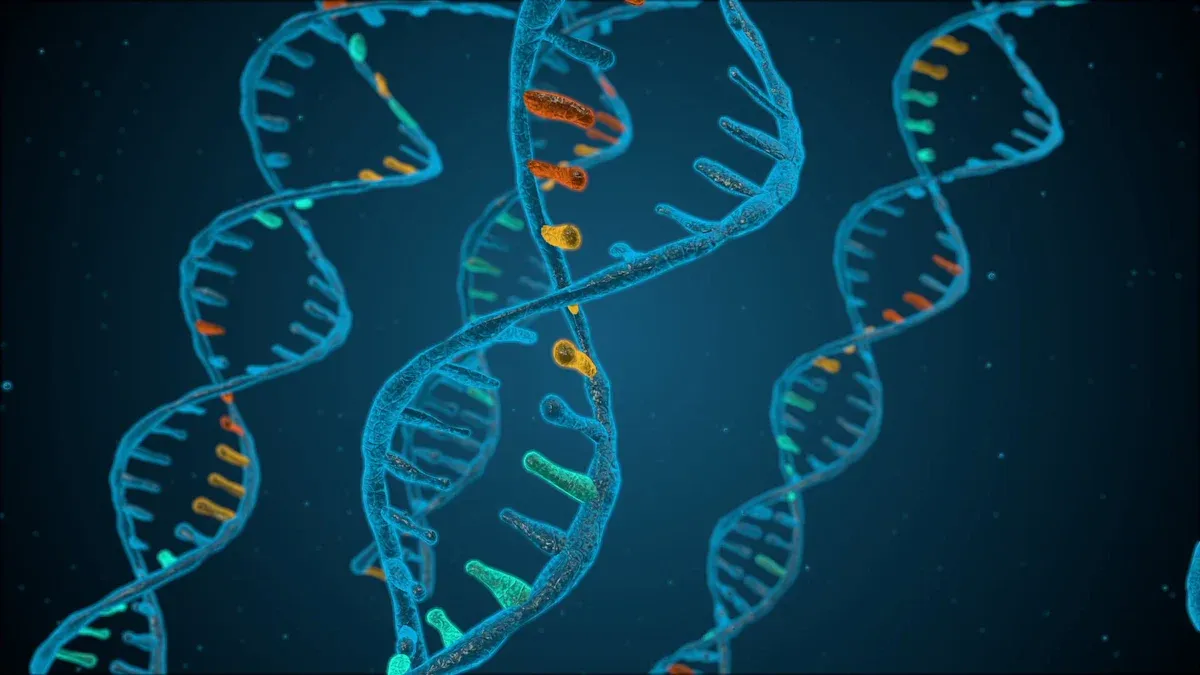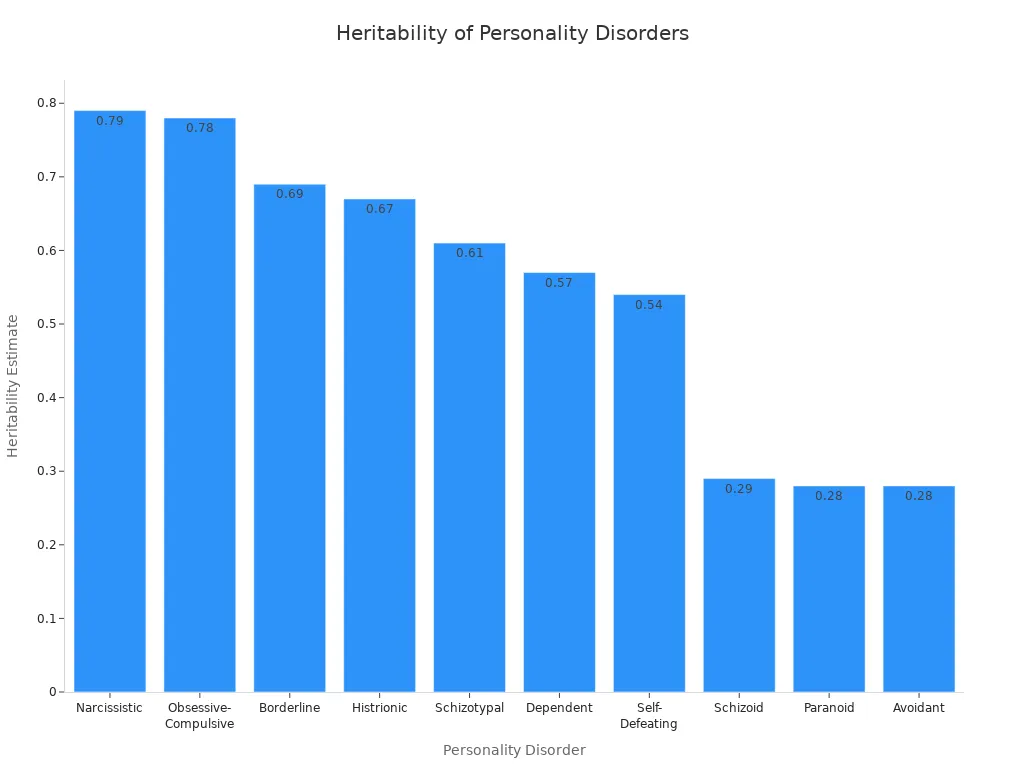Last updated on December 29th, 2025 at 09:33 am
Is narcissism hereditary? You might ask if narcissism is common in families. Twin studies show genes are important. One study says 64% of narcissistic traits come from genes. Other studies say the number is between 30% and 60%.
Things around you also affect these traits. How parents raise kids, childhood events, and friends all matter. If you wonder, “Is Narcissism Hereditary (Research Data Analysis)?” you learn both genes and life experiences are important.
TL;DR
Narcissism is linked to genes. Studies show 30% to 64% of traits come from genes.
Twin studies show identical twins share more traits than fraternal twins. This shows genes play a big role. Family life and how parents act also shape these traits.
Narcissism can be grand or hidden. This changes how traits show up in families. Childhood events like neglect or too much praise can cause these behaviors.
Good relationships and safe places can stop the cycle. This helps even if there is a genetic risk. Knowing how genes and life mix is important.
Source | Heritability Estimate |
|---|---|
Livesley et al. | 64% |
Other studies | 30% – 60% |
Is Narcissism Hereditary (Research Data Analysis)

Key Studies
Scientists want to know if narcissism runs in families. They use twin and family studies to find answers. Identical twins share all their DNA. Fraternal twins share half. Comparing these twins shows how much genes matter.
Researchers use models to study causes of narcissism. Univariate models show if genes or environment matter more. Bivariate models show how narcissism and extraversion can overlap because of shared genes. These methods help us see what shapes narcissistic traits.
Recent studies from 2012 to 2025 say genes play a big part. Life experiences also matter a lot. One study found about 64% of narcissistic traits come from genes. Other studies found numbers between 30% and 60%. So, genes are not the only reason.
Here is a table with heritability estimates from different studies:
Study | Heritability Estimate (%) | Year | Reference |
|---|---|---|---|
Livesley et al. | 64 | 2012 | Livesley et al., 2012 |
South et al. | 45 | 2014 | South et al., 2014 |
Torgersen et al. | 30-60 | 2015 | Torgersen et al., 2015 |
The numbers are different, but genes always matter.
Twin Research
Twin studies give strong proof about genetics. Identical twins have higher rates of narcissistic traits than fraternal twins. This means genes have a big effect.
Here is a table comparing heritability of personality disorders:
Personality Disorder | Heritability |
|---|---|
Narcissistic | 0.79 |
Obsessive-Compulsive | 0.78 |
Borderline | 0.69 |
Histrionic | 0.67 |
Schizotypal | 0.61 |
Dependent | 0.57 |
Self-Defeating | 0.54 |
Schizoid | 0.29 |
Paranoid | 0.28 |
Avoidant | 0.28 |

Narcissistic personality disorder has one of the highest rates. Genes matter a lot for this disorder.
Twin studies show differences between types of narcissism. Grandiose narcissism means acting bold and wanting attention. It has a heritability estimate of about 0.59. This is close to extraversion.
There is a genetic link between grandiose narcissism and extraversion. The genetic correlation is 0.42. Vulnerable narcissism means feeling insecure and sensitive. It may have lower heritability. Genes affect each type of narcissism in different ways.
Family Patterns
Families show patterns that go beyond genes. Narcissistic traits can pass down through behavior and family roles. For example, a narcissistic mother may call one child the “golden child” and another the “scapegoat.” These roles can change and cause rivalry.
Narcissistic mothers often pick favorites. This leads to sibling rivalry.
Children learn their worth depends on pleasing the parent.
These patterns create emotional manipulation and instability.
Families with narcissistic members show these patterns for generations.
Emotional abuse and gaslighting become normal. It is hard to spot the problem.
Family studies show genetics and environment shape narcissism. Identical twins are more alike in narcissistic traits than fraternal twins. This points to genetic influence. Parenting styles and family dynamics also matter. Nature and nurture mix together.
Environmental Factors

Some people show narcissistic traits even without family history. The environment you grow up in matters a lot. Childhood events and your social world shape how you see yourself and others.
Childhood Experiences
Adverse Childhood Experiences
Early life can leave strong effects. If you face neglect, you may have trouble with self-worth. You might also struggle to control your feelings. Studies say neglect or parents who praise too much can lead to narcissistic traits.
If parents ignore your feelings, you may feel invisible. You might protect yourself by acting tough. If parents treat you as extra special, you may think you deserve more than others.
Bad childhood events like neglect or trauma raise the risk of grandiose narcissism. These events can make you feel unsafe or unimportant. Later, you may seek attention and praise.
Parenting Styles
How parents raise you matters a lot. Both easygoing and strict parenting can cause grandiosity. If parents let you do anything, you may think you are better than others. If they control you too much, you may feel not good enough. You might try hard to prove yourself.
Here are some parenting styles linked to narcissistic traits:
Overindulgent parenting: Makes a child feel entitled and grandiose.
Authoritarian parenting: Can make kids feel not good enough and act out.
Cold and rejecting parenting: Lacks warmth and support, causing insecurity.
Lack of supervision and psychological control: Makes it hard to set real goals.
Parenting shapes how you see yourself and others. If rules change a lot or parents act cold, you may not trust people. You might not value yourself in healthy ways.
Parenting Style | Impact on Child | Associated Narcissism Type |
|---|---|---|
Overindulgent | High self-worth, entitlement | Grandiose |
Authoritarian | Insecurity, need for approval | Compensatory |
Cold/Rejecting | Low self-esteem, anxiety | Vulnerable |
Inconsistent | Confusion, unstable self-image | Mixed |
Social Influences
Your social world shapes you too. How people treat you, your culture, and media all matter.
Excessive praise or criticism: Too much praise can make you feel better than others. Too much criticism can make you want approval.
Neglect or abuse: Emotional neglect or abuse can make you feel insecure. You may seek attention to feel safe.
Parental overvaluation: If parents always say you are special, you may have unrealistic ideas about yourself.
Inconsistent parenting: Changing rules can make you unsure about your worth.
Competitive places and social media also affect you. If your society values winning and status, you may feel pressure to stand out. Social media makes you want likes and followers. This can make narcissistic behaviors stronger.
Influence Type | Description |
|---|---|
Individualism | Focus on personal achievements and status |
Competition | Belief that self-worth depends on accomplishments |
Social Media | Encourages self-promotion and validation-seeking behaviors |
Cultural Heritage | Rewards self-promotion and material success |
Media Influence | Shapes standards for attention and admiration |
Research shows wanting social status and praise drives many narcissistic traits. People who want attention often come from places that reward self-promotion or success.
If you see these patterns in your life, remember your environment shapes you. You can choose new paths. Knowing these influences helps you build better relationships and self-esteem.
Genetics vs. Environment
Nature and Nurture
You might ask if your genes or your life shape you. The answer is not easy. Think about making a cake. Genes are the main ingredients. Your environment is how you mix and bake them. Both are needed for the final cake.
Scientists say both nature and nurture matter a lot. You may have genes for certain traits. But these traits might not show unless something happens in your life. For example, you could have a family history of narcissism. A caring home can help you grow up differently.
Experts say, “Genetic predisposition can influence personality traits related to narcissism. Environmental triggers are necessary for the full manifestation of narcissistic behaviors.”
Here is a table that shows how genetics and environment work together for different types of narcissism:
Type of Narcissism | Heritability Rate | Environmental Influence |
|---|---|---|
Narcissistic Personality Disorder (NPD) | High | |
Vulnerable Narcissism | < 23% | High |
Grandiose Narcissism | Varies | More susceptible |
Even if genes matter a lot, your environment is still important. This means your DNA does not decide everything.
Key points to remember:
Genes set the stage, but environment directs the play.
Neither genetics nor environment alone determines narcissism.
Your experiences shape how your traits develop.
Let’s look at it more closely:
Some narcissistic traits, like grandiosity, can be passed down.
Genes and environment work together.
This shapes how you see yourself and others.
If you ask, “Is Narcissism Hereditary (Research Data Analysis)?” you will see both matter. You and your sibling can have the same genes. But if your lives are different, you may grow up differently.
Protective Factors
You might worry if narcissism is in your family. There is good news. Protective factors can help you. These are like shields that lower your risk, even if you have the genes.
Some important protective factors include:
Support from family or friends
Learning to handle stress
A loving home and good role models help you feel valued. Strong friendships also help. These supports catch you when things get hard.
Remember, you can shape your future. Genetics may load the gun, but environment pulls the trigger—or keeps it locked away.
If you focus on healthy relationships and learn to face problems, you can break the cycle. You are more than your genes or your past.
Risk for Children of Narcissistic Parents
Genetic Risk
If your parent has narcissistic traits, you might worry about your own risk. Genetics matter, but they do not decide everything. You get some traits from your parents, like eye color or height.
Narcissistic personality disorder (NPD) has a stronger genetic link than some other disorders. If your parent has NPD, you have a higher chance of having similar traits than with borderline personality disorder (BPD).
Here is a table comparing genetic risk for different disorders:
Disorder | Genetic Influence | Key Brain Areas Involved |
|---|---|---|
Narcissistic Personality | High | Empathy, self-regulation |
Borderline Personality | Moderate | Emotional processing |
NPD often runs in families, especially with close relatives.
Brain differences in empathy can show up in kids with genetic risk.
You might ask, “Will I become narcissistic?” The answer is no. Genes are only part of the story. Your choices and environment matter too.
Environmental Risk
Your home life shapes you every day. Growing up with a narcissistic parent brings special challenges. You may feel pressure to be perfect or fear being left out. Sometimes, you want approval because love feels like it depends on what you do.
Children in these homes often face:
Fear of rejection: You may want praise and worry about losing love.
Chronic anxiety and depression: Trying to meet high standards can make you anxious or sad.
Difficulty trusting others: You might find it hard to trust friends or partners.
Unstable personality traits: Mood swings can become normal.
Here is a table showing common risks for children of narcissistic parents:
Risk Factor | Description | Possible Outcome |
|---|---|---|
Conditional love | Love depends on meeting expectations | Anxiety, low self-esteem |
Constant criticism | Frequent negative feedback | Depression, self-doubt |
Emotional neglect | Lack of warmth and support | Insecurity, trust issues |
You may see these patterns in your life. If you do, remember you are not alone. Many kids feel this way. Your environment shapes your feelings, but you can learn new ways to cope.
Prevention
You can lower your risk, even if you have a genetic link or tough home life. Prevention can start early, but it is never too late to change. Caregivers are important in your first year. Secure attachments help you build empathy and healthy relationships.
Prevention strategies include:
Positive relationships: Build trust with friends, teachers, or mentors.
Emotion coaching: Learn to name and handle your feelings.
Education for parents: Parents who learn about attachment can help you more.
Early intervention: If you show aggressive or narcissistic traits, support can help you change.
Here is a table with prevention tips:
Strategy | How It Helps | When to Use |
|---|---|---|
Secure attachment | Builds empathy and trust | Infancy and childhood |
Positive reinforcement | Encourages healthy behaviors | All ages |
Early intervention | Stops negative patterns early | Childhood and adolescence |
You can shape your future. Early support and healthy relationships can break the cycle. If you worry about your risk, ask for help. You are more than your genes or your past.
Research Limitations
Gaps
You might wonder why scientists still argue about genes and narcissism. The way they study these traits is important. Some use twin studies. Others use genetic markers called SNPs. These methods often show different results. There is a gap between twin studies and SNP studies.
Methodological gaps can cause confusion. Twin studies usually show higher heritability than SNP studies.
Measurement bias makes results less reliable. Poor tools or unclear definitions give mixed answers.
Low phenotypic resolution hides the real picture. If traits are not measured well, scientists miss details.
Complex behavior problems add to the challenge. Narcissism has many behaviors. It is hard to separate genetic and environmental effects.
It is like trying to finish a puzzle with missing pieces. You see part of the picture, but not all of it. These gaps mean you should be careful when reading research. You might ask, “Can I trust these numbers?” Scientists need better tools to measure narcissism and its causes.
Future Directions
Researchers want to fix these gaps and give clearer answers. New methods will help scientists study narcissism better. Results will be more detailed as these methods become common.
Research Methodology | Description |
|---|---|
Variable-centered approach | Looks at grandiose and vulnerable traits separately. |
Person-centered approach | Finds how traits mix in people to spot subtypes. |
Longitudinal tracking | Follows changes in narcissistic traits over time. |
You might ask, “How will these new methods help me?” Variable-centered studies show how grandiose and vulnerable traits are different. Person-centered approaches show how traits mix inside you.
This helps experts find unique subtypes. Longitudinal tracking follows people for years. It shows how life events change narcissism.
Better research gives more accurate answers. You learn not just if narcissism is hereditary, but also how it changes and why. It is like watching a movie instead of seeing one photo. You see the story, not just a snapshot.
Conclusion
As science moves forward, you will get clearer guidance. Researchers will use smarter tools and longer studies. You will understand your own risk and learn how to build a healthier future.
You learn that both genes and your surroundings affect narcissism. Research says genes matter a lot, with numbers from 30% to 60%. How parents act and the culture around you also shape these traits. If you feel worried about family risk, here are some ideas:
Don’t make your child feel better than others.
Give rules that fit your child’s age.
Let your child know mistakes are okay.
Always show love, no matter what.
These steps help your child feel safe and supported as they grow.
Frequently Asked Questions
What does “heritable” mean for narcissism?
Heritable means you can get narcissistic traits from your parents, like you get your eye color. Genes give you a base, but your life shapes how these traits show.
Can you prevent narcissism if it runs in your family?
Yes, you can stop it. Good friends, healthy rules, and learning about feelings help lower your risk. It is like putting a strong fence around your yard to keep out weeds.
Do all children of narcissistic parents become narcissists?
No, not every child gets these traits. Your home, choices, and support matter a lot. You can break the pattern with self-awareness and help from others.
Is narcissism more common in men or women?
Studies say grandiose narcissism is seen more in men. Vulnerable narcissism can happen in both men and women. Who you are and your life matter more than gender.
Are there early signs of narcissism in children?
Yes, some signs are needing praise, not showing empathy, or acting like they deserve more. These signs do not always mean a child will be narcissistic. Early help and support can make a big difference.
Can narcissism get worse over time?
Narcissistic traits can get stronger if nothing is done, especially in tough or competitive places. Early help and good relationships can keep these traits balanced.
